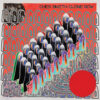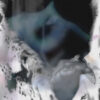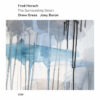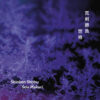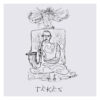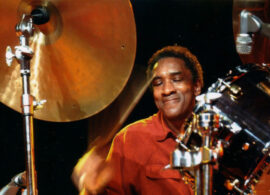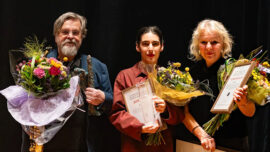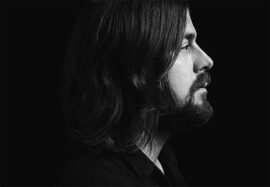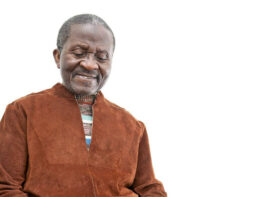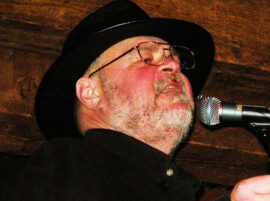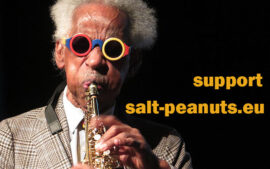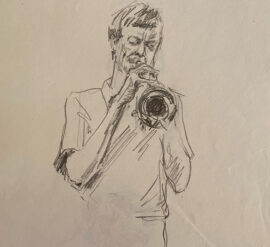Ny måned og nye tips fra de europeiske jazzredaksjoner om hva du skal sjekke ut av plater. Midt i sommerens festivalsesong, skulle man kanskje tro at leserne fikk nok av kreativ og god musikk, men i dagene etter at man har returnert hjem fra festivalbobla, kan det være deilig å sette dørene på full gap, sette seg utenfor med noe leskende i glasset, og putte på ny og spennende musikk i spilleren. Og her er hvilke tips redaksjonene i de beste jazzmagasinene i Europa kommer med for august.
Yves Tassin, JazzMania:
SPOOK The Brood (WERF Records)
Jos Demol, jazzhalo.be:
GONZALO RUBALCABA AND HAMILTON DE HOLANDA Collab (Sony Music Brazil)
Kaspars Zavileiskis, jazzin.lv:
VADIMS DMITRIJEVS QUINTET Integration! (Jersika Records)
Christof Thurnherr, Jazz’n’More:
NANA SINEPHRO Endlessness (Warp Records)
Jacek Brun, www.jazz-fun.de:
STEPHAN STADFELD LARGE ENSEMBLE – Caught in a Rug (XJAZZ! Music)
Madli-Liis Parts, Muusika:
MARIA FAUST JAZZ CATASTROPHE: 3RD MUTATION Moth (Bush Flash Records)
Mike Flynn, Jazzwise:
TRIO GRANDE Urban Myth (Whirlwind Recordings)
Paweł Brodowski, Jazz Forum:
MATEUSZ SMOCZYŃSKI Adam’s Apple (Warner Music Poland)
Krzysztof Komorek, Donos kulturalny:
GADT / GRZYWACZ / KORDIAK / ZAGAJEWSKA Voiceact (Fundacja Słuchaj)
Jan Granlie, salt-peanuts.eu:
JESSICA ACKERLEY All Of the Colours Are Singing (AKP Recordings)
Dick Hovenga, Written in Music:
KESSONCODA Outerstate (Gondwana Records)
Viktor Bensusan, jazzdergisi.com:
JOHN ZORN Nothing Is As Real As Nothing (Tzadik)
Nuno Catarino, jazz.pt:
ANDRÉ MURRACAS Regularly Irregular (Roda Music)
Henning Bolte, freelance:
AB BAARS / JOOST BUIS / BERLINDE DEMAN Cecil’s Dance (Wig)
Sebastian Scotney, UK Jazz News:
ZARA MCFARLANE Sweet Whispers: Celebrating Sarah Vaughan (Eternal Source Of Light/!K7 Records)
Lars Mossefinn, Dag og tid:
PANDEMIC SOLUTION Afterdog (Blåmann Records)
Patrik Sandberg, Jazz:
PAT METHENY MoonDial (BMG)
Cim Meyer, All That …:
BÉVORT 3 Live 2020-2021 (Gateway)
Matthieu Jouan, citizenjazz.com:
MARGAUX OSWALD COLLATERAL DAMAGE In time, hollow oaks become chapels (Clean Feed)
Axel Stinshoff, Jazz thing:
HELVETICUS Our Way (Blaser Music)
Luca Vitali, Giornale della Musica:
SIDSEL ENDRESEN, JAN BANG, ERIK HONORÉ Punkt Live Remixes Vol. 2 (Punkt Editions – Jazzland Recordings)
Why did I choose –
Nuno Catarino:
Saxophonist André Murraças makes his debut as a leader on this album, the 20th edition of the Roda Music catalog. The album «Regularly Irregular» brings together a set of original compositions by the saxophonist, assuming the will to affirm his individual voice. On this recording, he is accompanied by three proven musicians: João Carreiro on guitar, Francisco Brito on double bass and Luís Candeias on drums. An album full of good ideas, full of contrasts, where Murraças asserts himself not only as an competent instrumentalist but also as a fine composer.
Dick Hovenga:
Based on the first tracks released from West London’s Kessoncoda, you wouldn’t exactly have the idea that this was just a duo. Together, drummer Tom Sunney and keyboardist Fil Sowa create a grandly ambitious sound that is as cinematic and atmospheric as it is dynamic. Sunney and Sowa have worked hard on their sound over the past few years, in Sunney’s little house in the garden. It is particularly clever how Sowa builds up his keyboard parts layer upon layer and lays down that wall-to-wall sound. At the same time delicious and ironclad how Sunney lays down his rhythms under and over those rich keyboard parts. Outerstate is nicely in line with what we hoped to expect based on previously released splendid tracks like X Is Closer to A, Greyscale and Hammers. Sunney and Sowa have created an album whose musical adventure seeking takes on an interesting ambitious color. Their compositions are also captured in a fantastic sounding way. Outerstate is an overwhelmingly good debut. Very convincing in tracks as in variety and coherence. And when the tones of the incomparable album finale Amaya (these are really just two musicians!!!) die away, you immediately get a very serious urge to listen to it all again right from the beginning. Great album.
Krzysztof Komorek:
Four individualities of Polish vocalism met to record an album devoted to the art of the voice. Voiceact, which is music of the vocal avant-garde, hides many layers, revealing references and inspirations that accompanied the vocalists during the recording of the material. Although this may just be an unmasking of the paths that the listener’s imagination follows. We move here from ancient music to modern contemporary classics. We look into folk. We follow a showcase of vocal styles and possibilities. A performance about Voice, and not just with the Voice in the lead role. A vocal act that is unusual and fascinating.
Jacek Brun:
This album confirms Stephan Stadtfeld’s extraordinary talent and offers music full of warmth and energy. The individual compositions are brilliantly orchestrated and not without exciting improvisations. The bandleader gives the whole band a lot of space. Great compositions, beautiful (sometimes even hit-like) melodies and the creative ingenuity of all members of this great ensemble make this album something very special that you can’t pass by indifferently!
Henning Bolte:
The music of this new trio i first experienced live a few months ago at the Concertgemaal in Amsterdam, the building of an old steam pumping station from 1875, part of the widespread system of water level management in the Dutch polder landscape and at that time substituting a previous system of 50 windmills. It stands symbol of a long, permanent effort and struggle to keep land and water in balance in North-Holland (and other areas).
The location and its history in a remarkable way stood also symbol for the longstanding musical purification process of three exceptional musicians with and on their instruments, namely clarinets, shakuhachi, tuba, serpent and trombone. Their music came forth from a deep layer of their instruments’ sound capacities brought into/onto a sophisticated level of exceptional truly characterful sound creation. There was the magical instrumental sound of their wonderful wind instruments – confluent, spectralizing, underlayering, contrapuntal, doubling back, zigzagging – together with their marvellous kind of musical shorthand in marking directions, ways and trails. Also there was the complete lack of acting weighty. Instead there was the immediacy of a common sound space that allowed to enter and traverse from surprising hooks and make purely enjoyable jumps, jolts and connections with superb transitional qualities from a deeper common fund. It was one of the best concerts in months I experienced.
In the album’s nine pieces (eight of it conceived by Ab Baars), they thrive and flourish in a wonderful variety of moods among the pieces as well as in the pieces itself all guided by a unifying steady hand. In short, it is music of an astonishing maturity, elegantly wise sound quality, high palimpsestic quality and all over inspiring persuasiveness. Its music comes forth from familiar rich personal musical histories and performance experiences but is here transformed to a higher level of mutually absorbing momentum. It especially excels by its orchestration virtue. The music is true to the essence of sound(s), is evident as well as original and sounds/feels free and freed in an ultimate way.
The album’s music makes that listeners can surrender in deep focus to associations and Anklänge. For example, the bluesy trombone intro in the piece “This nearly was mine” can evoke associations with alto saxophonist Johnny Hedges’ playing. After a while from a remote place a soft silvery clarinet sound comes flying in under the tuba and trombone lines, intoning a perfectly fitting tune from collective memory, the piece of Roger/Hammerstein from the musical “South Pacific” from 1949 (!). But it could also be related to Friedrich Hollaender’s quite identical song “Von Kopf bis Fuss …” , known from its definite version by Marlene Dietrich from the movie “Der Blue Engel” from 1930 (!). The trio’s piece has a new quality of its own flowing into a solo expansion by prudent and waggish tubaist Berlinde Deman.
Nothing here is how it was on known ground and the other eight pieces with its rich connections, a.o. to musician as John Carter, Tristan Honsinger and Guillaume de Machaut as well as poet Johnny The Selfkicker, roosters, children rhymes etc., are housing entertaining and inspiring little big treasures to discover and enjoy.
Sebastian Scotney:
The singer’s best album to date benefits hugely from the involvement of a stunning group of Kansas Smitty’s regulars: Giacomo Smith, Joe Webb. Ferg Ireland. Jas Kayser…
Yves Tassin:
Because : We almost reach a psychedelic stage which evokes the 1970/1972 period of Pink Floyd (Atom Heart Mother / Meddle).
Jos Demol:
The music is sometimes abstract and complex but the enthusiasm and warmth of both musicians make it an inspiring listen. An album to treasure! (Stephen Godsall)
Kaspars Zavileiskis:
Vadims Dmitrijevs is a Latvian jazzman of the new generation, who has already announced himself as a convincing and attractive trombonist, as well as a composer. He spent three years studying in Hamburg, where he got to know great young talents from other countries and together with them created the original music program Integration!. It turned into his debut album, which was recorded analogically in the leading Riga’s jazz club M/Darbnīca, and released on vinyl by the Latvian jazz label Jersika Records. Catchy bop groove, finely crafted themes and fresh energy are the main values of Vadims Dmitrijevs debut record. An album that will make the heart of every music lover who loves quality modern live jazz beat faster. We’re looking forward to the sequel, and we already know there will be one.
Matthieu Jouan:
Seven variations on silence, all irregular. For Collateral Damage, Margaux Oswald’s septet, silence is merely raw material, a concept to be shaped; it has to be said that the young pianist didn’t build her orchestra with a chamber instrumental: two guitars, three double basses and drums played by the Danish Simon Forchammer. It’s enough to shake the tranquility. And yet: «Secilen» works a brutalist silence with great patience. The bow of a double bass fades into a few barely distilled sprays of piano, and a drum discreetly recedes. There’s no exaggeration, no clean break, just a few cracks in the electric guitars. This is groundwork, aftershocks of a deep earthquake that hasn’t hit the surface yet, but threatens to. Full, whole. Invisible. Sometimes it erupts, always in muted tones, especially when Oswald’s piano plows through the orchestral paste with a powerful left hand («Clinese,» the most torturous track on this first album.
In time, hollow oaks become chapels expresses this music of the moment, the septet’s particularly successful chemistry. There’s something deeply animistic in Margaux’s work, a sap that nourishes a carnal, elemental music that has taken time to mature, where each sound has a meaning and proposes a deviation. (Franpi Barriaux)
Jan Granlie:
Over the past decade, Jessica Ackerley has made her mark on the Canadian and American music scene as a unique and versatile guitarist, composer and bandleader. Born in Alberta, Canada, she now resides in Honolulu after nearly ten years in New York City. She has worked with musicians such as Tyshawn Sorey, Daniel Carter, Marc Edwards, Luke Stewart, Patrick Shiroishi and Jason Nazary, to name a few. And her latest release, All Of the Colors Are Singing, has become a brilliant, exciting, creative and delicious release that will stay with me for a long time.
Patrik Sandberg:
MoonDial features Methenys solo recordings in line with the beloved One Quiet Night (2003) and What’s It All About (2011). The album is a purely solo guitar record with no overdubs, using a custom nylon string baritone guitar. Metheny experimented with this new guitar while on tour last fall. Excited by the results he was able to achieve a lot of material each night.
Cim Meyer:
…showcases the raw power and inventiveness of her playing and composition skills” (Jazzfuel) Pernille Bévort (ts / ss), Morten Ankarfeldt (b), Espen Laub von Lillienskjold (d).
Viktor Bensusan:
This is an album having neither horn nor Zorn inside, with one of the best elegant guitar trios since that very Friday Night in San Francisco by Al Di Meola, John McLaughlin and Paco de Lucía. The trio of Bill Frisell, Gyan Riley, Julian Lage perform as one solo guitar and John Zorn overwhelms even with his absence…»
Paweł Brodowski:
The Polish violinist Mateusz Smoczyński is best known as the pillar of the Atom String Quartet and at one time – for four years – a member of the Turtle Island Quartet, but he has also pursued a succesful solo career.
When pianist Adam Makowicz recorded his first American album back in the 1970s, it came out on CBS under the the title Adam. I remember I suggested it shoud have been called Adam’s Apple to signify his arrival on the New York jazz scene. It was explained to me that such a title had already been used by Wayne Shorter on his Blue Note album some ten years earlier.
Historical considerations were obviously not taken into account with Mateusz Smoczyński’s newest album whose title is a bow to the American classical composer John Adams (Smoczyński’s newest discovery and inspiration), but is also a reference to the Bible.
Released by Warner Music Poland, the album features two violin concertos: Mateusz Smoczyński’s “Adam’s Apple Concerto for Violin and Orchestra” (written in 2018) and Zbigniew Seifert’s “Jazz Concerto for Violin, Rhythm Section, and Symphony Orchestra,” written and performed by Zbiggy 50 years ago for NDR Hannover and never before published.
Supported by the Chopin University Chamber Orchestra, Mateusz displays his virtuosity, imagination and improvising zest. In Seifert’s “Concerto” he is additionally joined by an inspired rhythm section of jazz peers: Dominik Wania – p, Sławomir Kurkiewicz – b and Michał Miśkiewicz – dr. The first concerto is more classical, the second more jazzy. Overall, a powerful performance, a triumph!


